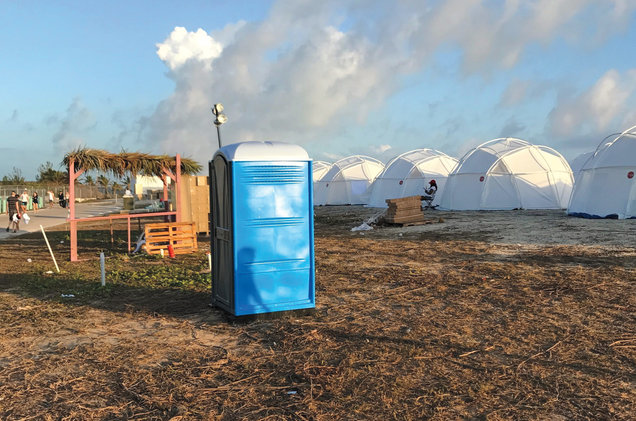The warning signs were evident as early as December 2016. Billy McFarland, a 25-year-old “tech bro,” as the New York Post once described him, decided to announce his and rapper Ja Rule’s plans for Fyre Festival — an ultra-luxury two-weekend musical event that would take place on Norman’s Cay, in the Exumas district of the Bahamas — with a lavish party. McFarland, the son of two real estate developers, wanted the festival’s Tribeca headquarters transformed into a Bahamian island pitched with extravagant tents in which guests would be served high-end food and gifted expensive leather-bound passport books.
But just days before the party, McFarland canceled. Not enough influencers had RSVP’d, one former Fyre insider told Billboard, and McFarland opted to eat the $50,000 he had spent rather than be embarrassed by poor attendance.
Five months later, the first-time festival that McFarland and Ja Rule had planned also imploded in spectacular fashion, generating a hail of angry social media posts by attendees who had arrived expecting yachts, villas and a lineup that included Migos, Major Lazer and Blink-182. Instead, they were met with FEMA-style tents filled with wet bedding, luggage dumped out of shipping containers, sweaty cheese sandwiches and widespread chaos.
Seth Crossno, a blogger who documented firsthand the disastrous proceedings on his Twitter feed (@WNFIV), recalls McFarland “standing on a table being very condescending. He’d say stuff like, ‘OK, who’s the next person to ask me the same question for the hundredth time?’ ”
McFarland and his Fyre Fest co-founder Ja Rule will have many more questions to answer in the coming weeks. (They did not respond to Billboard’s requests for comment.) In the aftermath of the festival’s cancellation on April 28, just hours before its official start, the duo has been hit with at least two class-action suits — one filed by celebrity attorney Mark Geragos that alleges Fyre was a “get-rich-quick scheme” and seeks $100 million, including damages. There is the question of whether McFarland can make good on his promise to refund all ticket holders, and of who will be on the hook for the estimated $10 million to $25 million that Fyre lost. Finally, there are those in the concert industry who wonder how two inexperienced promoters convinced themselves that they could build a festival, from the ground up, on an undeveloped island, that would deliver a high-end experience featuring VIP packages that topped out at nearly $400,000.
Certainly, the demand was there. Industry sources tell Billboard that about 10,000 people bought into the hype at an average cost of $2,500 to $4,000, a sign of the appetite for high-end destination festivals. Last year’s Desert Trip in Indio, Calif., was AEG’s highest-grossing festival to date, with many middle-aged attendees spending $1,599 for pit passes to see acts that included The Rolling Stones and Paul McCartney.
Fyre was different in that it was aimed at — and organized by — millennials. “People made such a big deal of the price of the tickets,” says one agent, “but people were buying them.”
The idea for Fyre was born out of a Halloween 2016 trip that McFarland and Ja Rule took to the Bahamas. First announced at the XLIVE conference in December, the festival reportedly was backed by early investor Carola Jain, the wife of Bob Jain, co-chief investment officer at Millennium Management.
With few logistics worked out, Fyre nonetheless began selling tickets thanks to social media endorsements from 500 “Fyre Starters,” influencers such as Kendall Jenner, who was paid $250,000 for endorsing the festival, according to sources. Other models, including Bella Hadid, were flown to the Exumas and paid six figures to star in a glitzy sizzle video, while other heavily followed Instagram celebrities were given $10,000 per post, sources said. One of the lawsuits filed alleges that none of the influencers disclosed the payments, violating the Federal Trade Commission’s marketing guidelines.
McFarland also hired a TV production company in January to start shooting a reality TV show around the festival, but failed to pay the $100,000 bill. Booking agencies including CAA, Paradigm, ICM and UTA encountered similar non-payment issues. “They were in breach of contract from the get-go,” says one agent.
As the festival dates loomed, McFarland secured a $5 million high-interest loan to keep Fyre afloat, according to one insider. And sources say that even though production was laughably behind, McFarland was dismissive of the setbacks. Unable to secure the private island he and Ja Rule had advertised, they quietly shifted the festival site to an empty settlement on the well-trafficked island of Great Exuma, near a Sandals resort. And after hiring and firing three staging and production companies, McFarland told staff he would do it himself.
The lack of preparation spooked Blink-182, the first and only band to officially cancel its headlining slot on April 27, the night before opening day. Other performers, including Major Lazer and Skepta, were warned by their teams not to come. (Several agents told Billboard that their acts were not returning their guarantees.) That same night, Bahamian officials, seeing trouble ahead, canceled the remainder of incoming flights from Miami.
While it’s unclear if Fyre was insured, most underwriters would likely conclude that it breached terms of its policy, says Dan Berkowitz of VIP outfitter CID Entertainment. Berkowitz, who talked with Fyre early on, expects more lawsuits before the dust settles. “This wasn’t the tropical paradise many were expecting,” he says. “This was survive and escape.”
In addition to refunds, McFarland also promised that ticket holders will receive VIP status when he reboots Fyre in 2018. But Jesse Stoll, a talent buyer/producer at AEG Presents Southeast, says, “I highly doubt they’re going to be able to pull that off, and I don’t see anyone caring enough to go.” Stoll, who lost a couple of thousand dollars on airfare and an Airbnb residence he had rented for the festival, tells Billboard, “It’s going to be extremely difficult for them to get any credibility back.”
This article originally appeared on Billboard.





